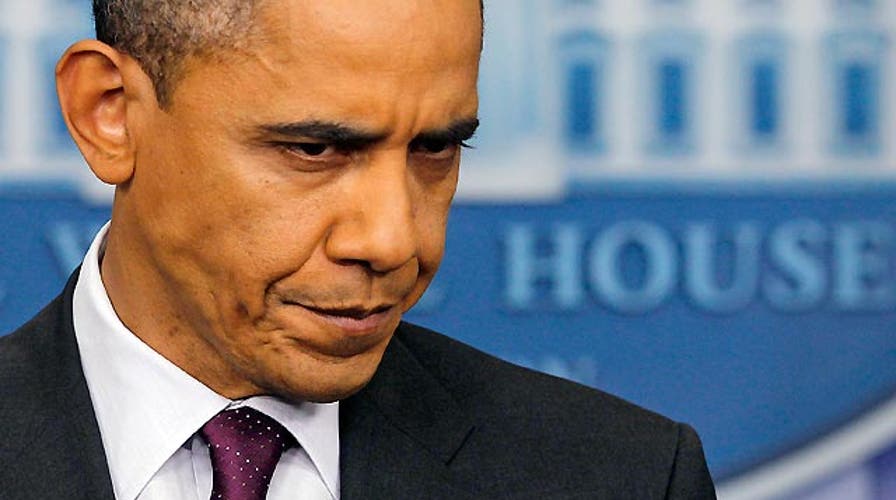This is a rush transcript from "Special Report," April 9, 2013. This copy may not be in its final form and may be updated.
(BEGIN VIDEO CLIP)
KATHLEEN SEBELIUS, HEALTH AND HUMAN SERVICES SECRETARY: I think there was some hope that once the Supreme Court ruled in July and then once an election occurred there would be a sense that this is the law of the land, let's get on board, let's make this work. And, yet, we find ourselves still having sort of state-by state political battles and, again, creating what I think is just a lot of confusion.
RON BONJEAN, REPUBLICAN STRATEGIST: This is a very confusing piece of legislation that is now law. They are still making rules about it. They are still trying to figure out how to implement it. They are delaying key parts of it, and that is very frustrating to the governors and to the American people.
(END VIDEO CLIP)
BRET BAIER, ANCHOR: Well, Health and Human Services Secretary Kathleen Sebelius speaking at Harvard, saying that, well, it's just been much tougher than they anticipated implementing ObamaCare, and the push back has been much more intense than they anticipated. Critics saying we told you so. Wyoming Senator Republican John Barrasso taking to the Senate floor today, saying he would like the honesty to continue from the administration, saying, quote, "It's time for President Obama to finally admit that his health care law is dragging down the American economy." Barrasso is a doctor who often speaks out about ObamaCare.
We're back with the panel. Nina, it appears that the administration is dealing with the tough implementation every day.
NINA EASTON, COLUMNIST, FORTUNE MAGAZINE: But there is a long way to go. When this was first passed there was a lot of kind of calming public concerns by saying, by first of all having these popular provisions out first, like you can keep your child on your policy until you're 26 -- until the child is 26.
And then the president saying, well, don't worry. This isn't going to affect any of you who already have health insurance. Well, lo and behold now people if you work for a big company, you are scared that the big company might decide to end its health insurance. Its rich, now it has to have a rich health insurance plan and it might end that and pay the penalty instead, and you will break the law if you don't buy your own health insurance.
If you work for a small company, you have to worry about whether the company is going to put you on a part-time basis so that they don't have to insure you. If you're a small business owner, you have to worry about premiums going up because there is a lot of talk that premiums are going to be going up both for individuals and small businesses. And if you are a citizen in one of the 33 states that haven't signed up to build an exchange, where does ObamaCare leave you?
So there is all this uncertainty out there that this reality, and I know Sebelius talked about political battles within the states, but there is also a realism behind a lot of the uncertainty.
BAIER: It was kind of surprising to hear Sebelius be surprised, wasn't it?
A.B. STODDARD, ASSOCIATE EDITOR, THE HILL: I mean, they knew all along that one of the main criticisms, the strongest criticism against their health care law was that it was -- there was no one size fits all federal health care program required, that each state should handle it on its own and private market. So they knew that they were going to be creating -- building the exchanges and having state-by-state political negotiations over implementation. It was always going to be difficult, it was always going to be challenging and necessary. But it shouldn't be surprising.
And it really is strange that they thought the Supreme Court decision, you know, in an election would just take care of it. Public opinion on this law is still really poor. And I think as they get in to, you know, the exchanges and all this other instability with premiums rising and everything, it's going to become more and more unpopular.
BAIER: Because Byron, a 2,700 page bill with 17,000 pages of regulation, that's a little complex.
BYRON YORK, CHIEF POLITICAL CORRESPONDENT, WASHINGTON EXAMINER: I mean, it's a little rich to hear her suggesting that she was kind of surprised that it's all so complicated. They also weren't listening to Republican governors out there. There is now a majority of the states have Republican governors. And the reason they are not doing the exchanges is they don't trust the federal government. They believe that it's going to cost them money if they were to set up an exchange. And they believe the promises that they would have some control of the exchange will not happen.
And as far as expanding Medicaid, which is another huge part of ObamaCare, they don't believe the federal government's promise that the feds will pick up the charges for that increase, you know, forever and ever.
BAIER: Quickly down the line, how much a factor does this start to become as we head into 2014?
YORK: A huge factor.
STODDARD: I think significant by the end of next year.
EASTON: I agree it's going to be a bad factor for the White House.
BAIER: And is repeal a running point? Is repeal something Republicans run on?
EASTON: It could be. I mean, this was an entitlement unlike Medicare and Social Security that was not passed with bipartisan support, and it's been haunting this White House ever since. And it will continue to.
BAIER: We will continue to talk about this, something tells me, on this panel for many panels to come. That's it, but stay tuned for our weather report that will blow you away.

